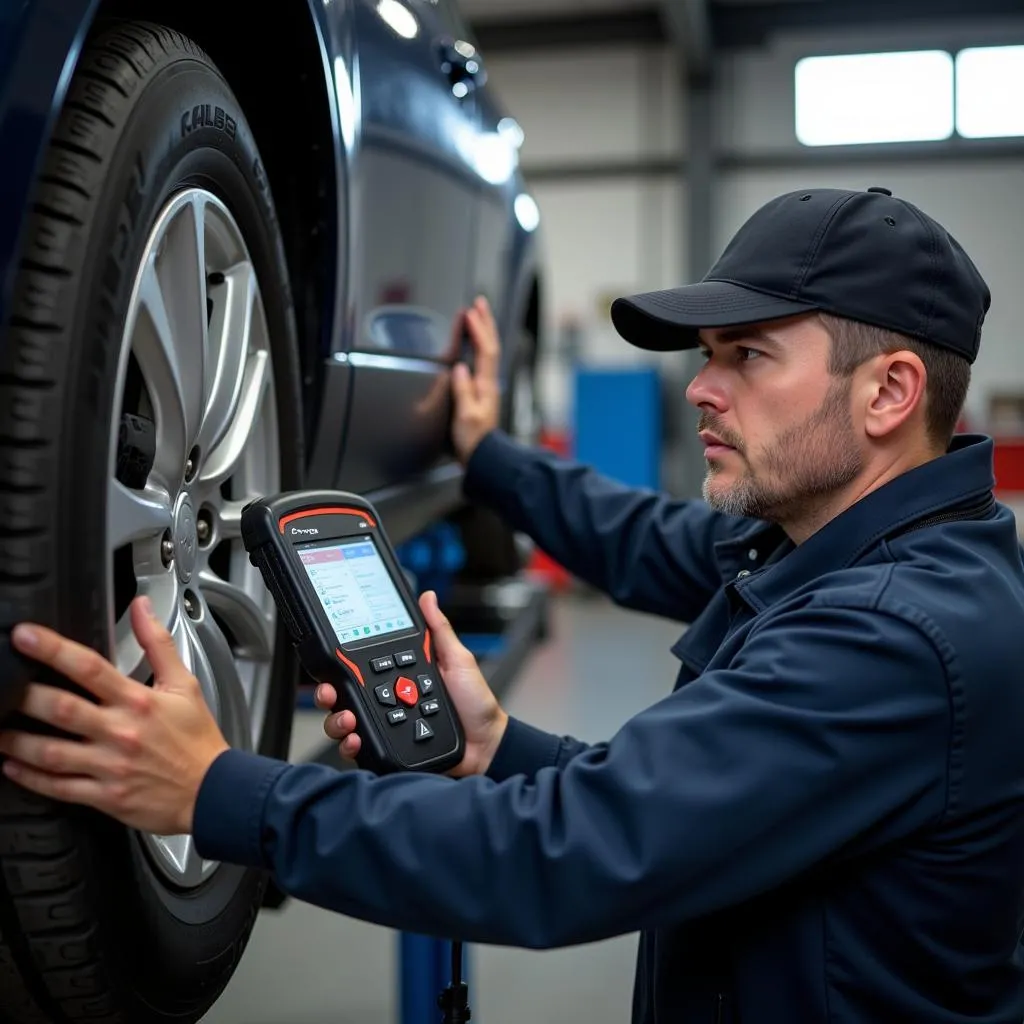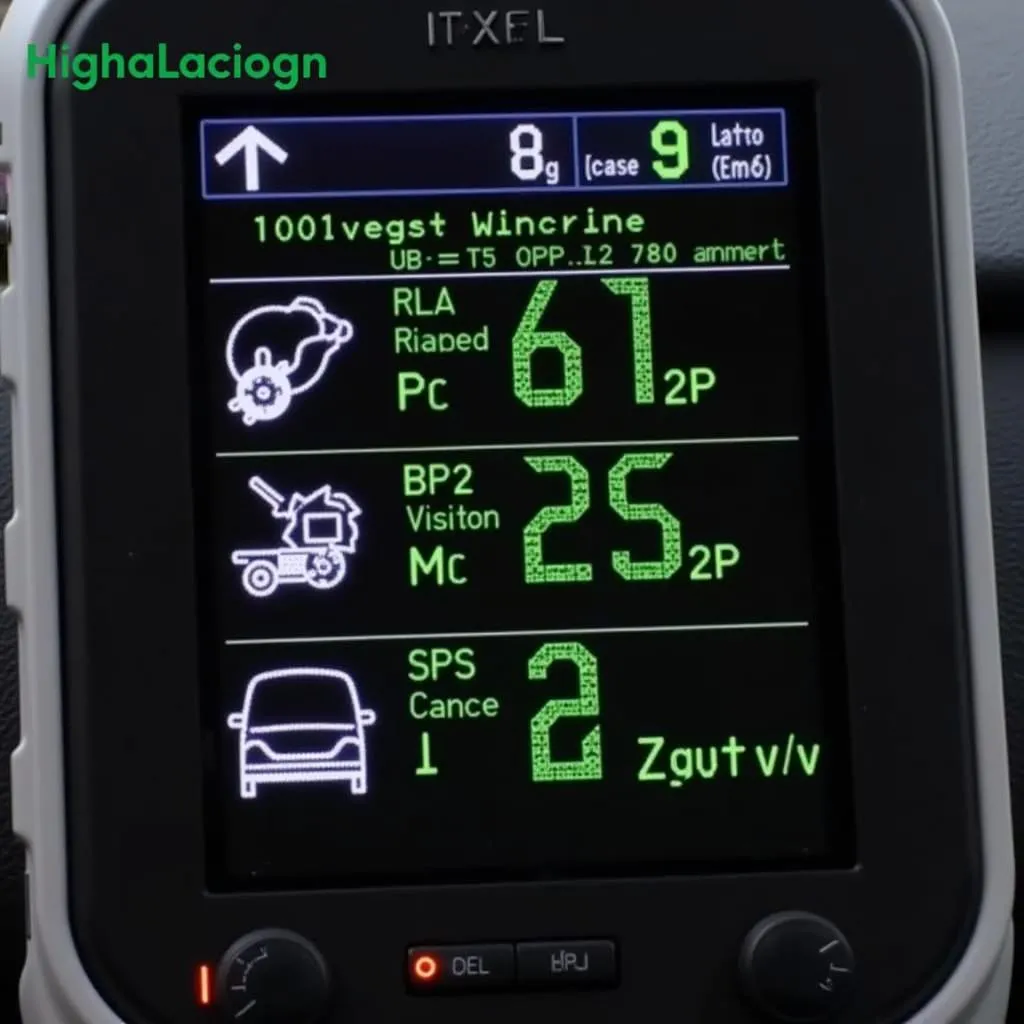An OBD2 scanner is an essential tool for any car owner or mechanic. It allows you to tap into your vehicle’s onboard computer, revealing a wealth of information about its health and performance. This comprehensive guide delves into the world of OBD2 scanners, exploring their functionalities, benefits, and how to choose the right one for your needs.
Decoding the Mystery: What is an OBD2 Scanner?
OBD2 stands for On-Board Diagnostics, Generation Two. It refers to a standardized system implemented in vehicles manufactured since 1996 (in the United States) to monitor and report on various aspects of engine performance and emissions. The OBD2 scanner acts as the key to unlock this system, allowing you to access and interpret the data it stores.
Think of it as a translator between your car and you. While your car speaks in complex codes, the scanner translates these codes into understandable language, revealing potential issues and even suggesting solutions.
Why Should You Care About OBD2 Scanners?
Owning an OBD2 scanner empowers you with valuable information about your vehicle. Here’s why it’s a worthwhile investment:
- Early Problem Detection: By reading your car’s diagnostic trouble codes (DTCs), you can identify potential issues before they escalate into major problems, saving you time and costly repairs down the line.
- Improved Fuel Efficiency: OBD2 scanners can monitor fuel economy parameters, helping you identify areas for improvement in your driving habits and ensuring optimal engine performance.
- Enhanced Car Maintenance: With insights into your car’s health, you can proactively address maintenance needs, extending the life of your vehicle.
- DIY Repairs: For the mechanically inclined, OBD2 scanners can guide basic repairs and troubleshooting, reducing reliance on mechanics for minor issues.
- Peace of Mind: Knowing you can instantly check your car’s status provides peace of mind, especially before long trips or if you suspect something is amiss.
 Mechanic using an OBD2 scanner in a garage
Mechanic using an OBD2 scanner in a garage
Navigating the Scanner Landscape: Types of OBD2 Scanners
The market offers a variety of OBD2 scanners, each catering to different needs and budgets. Here’s a breakdown of the most common types:
- Basic Code Readers: These entry-level scanners primarily read and clear DTCs. They are affordable and suitable for casual car owners.
- Bluetooth Scanners: These scanners connect to your smartphone or tablet via Bluetooth, providing a user-friendly interface and often offering additional features like data logging and graphing.
- Professional-Grade Scanners: Utilized by mechanics and advanced DIYers, these scanners offer extensive functionalities, including live data streaming, bi-directional control, and access to manufacturer-specific codes.
Choosing the Right OBD2 Scanner for You
Selecting the ideal OBD2 scanner depends on your individual requirements:
- Casual User: A basic code reader or a budget-friendly Bluetooth scanner would suffice for occasional check-ups and basic diagnostics.
- DIY Enthusiast: Opt for a mid-range Bluetooth scanner or a dedicated handheld device with live data streaming and additional features to support your repairs and maintenance tasks.
- Professional Mechanic: Invest in a high-end professional-grade scanner that offers comprehensive functionalities, including manufacturer-specific codes and advanced diagnostics.
Unlocking the Power of OBD2 Scanners: Key Features
Modern OBD2 scanners come equipped with a range of features:
- Reading and Clearing DTCs: This core function allows you to identify and clear error codes, providing insights into your car’s health.
- Live Data Streaming: Monitor real-time engine parameters like speed, RPM, coolant temperature, and oxygen sensor readings.
- Freeze Frame Data: Capture a snapshot of sensor readings when a DTC is triggered, aiding in diagnosing intermittent issues.
- Mode 6 Testing: Access advanced diagnostic information and perform component monitoring for in-depth analysis.
- ABS and SRS Support: Some scanners offer the ability to read and clear codes related to the Anti-lock Braking System (ABS) and Supplemental Restraint System (SRS).
obd2 scanner with key programming
 OBD2 scanner displaying engine data
OBD2 scanner displaying engine data
Maximizing Your OBD2 Scanner: Tips and Tricks
- Regular Scans: Make it a habit to scan your car regularly, even if there are no apparent issues, to catch potential problems early on.
- Understand the Codes: Familiarize yourself with common DTCs and their meanings. Online resources and the scanner’s manual can be helpful.
- Consult a Professional: If you encounter complex codes or are unsure about interpreting the data, don’t hesitate to seek professional help.
harbor freight obd2 scanner review
Conclusion
An OBD2 scanner is an invaluable tool for any car owner. From simple code reading to advanced diagnostics, it empowers you with the knowledge to understand and maintain your vehicle’s health, potentially saving you time, money, and frustration in the long run. By choosing the right scanner for your needs and utilizing its features effectively, you can take control of your car’s well-being and enjoy a smoother, more confident driving experience.
obd2 scanner with abs auto bleed
FAQs
1. Are all OBD2 scanners compatible with all cars?
Most OBD2 scanners are compatible with cars manufactured after 1996 in the United States. However, it’s essential to check the scanner’s specifications and your car’s compatibility before purchasing.
2. Can I use an OBD2 scanner to program a new key?
Some advanced OBD2 scanners offer key programming functionalities. However, this feature is often found in professional-grade models.
3. How often should I scan my car with an OBD2 scanner?
It’s recommended to scan your car at least once a month or before embarking on long trips. Regular scans help detect potential issues early on.
4. Can I fix all car problems identified by an OBD2 scanner?
While an OBD2 scanner can pinpoint issues, it’s crucial to remember that it’s a diagnostic tool. Fixing complex problems might require professional mechanical expertise.
5. Where can I find reliable information about specific DTCs?
Online resources, your car’s manual, and the scanner’s documentation are excellent sources of information for understanding DTCs.
6. What are some common mistakes to avoid when using an OBD2 scanner?
Misinterpreting codes, clearing codes without addressing the underlying issue, and using an incompatible scanner are common mistakes to avoid.
7. Can I use an OBD2 scanner to improve my car’s performance?
While not a performance enhancer, an OBD2 scanner can help optimize fuel efficiency and engine performance by providing insights into engine parameters.
best obd2 scanner for ram 1500
We encourage you to explore our website for more in-depth reviews and comparisons of various OBD2 scanners available on the market.
Need assistance choosing the right OBD2 scanner or have any further questions? Our team is here to help! Contact us via WhatsApp: +1(641)206-8880, Email: [email protected] or visit us at: 276 Reock St, City of Orange, NJ 07050, United States. We offer 24/7 customer support.